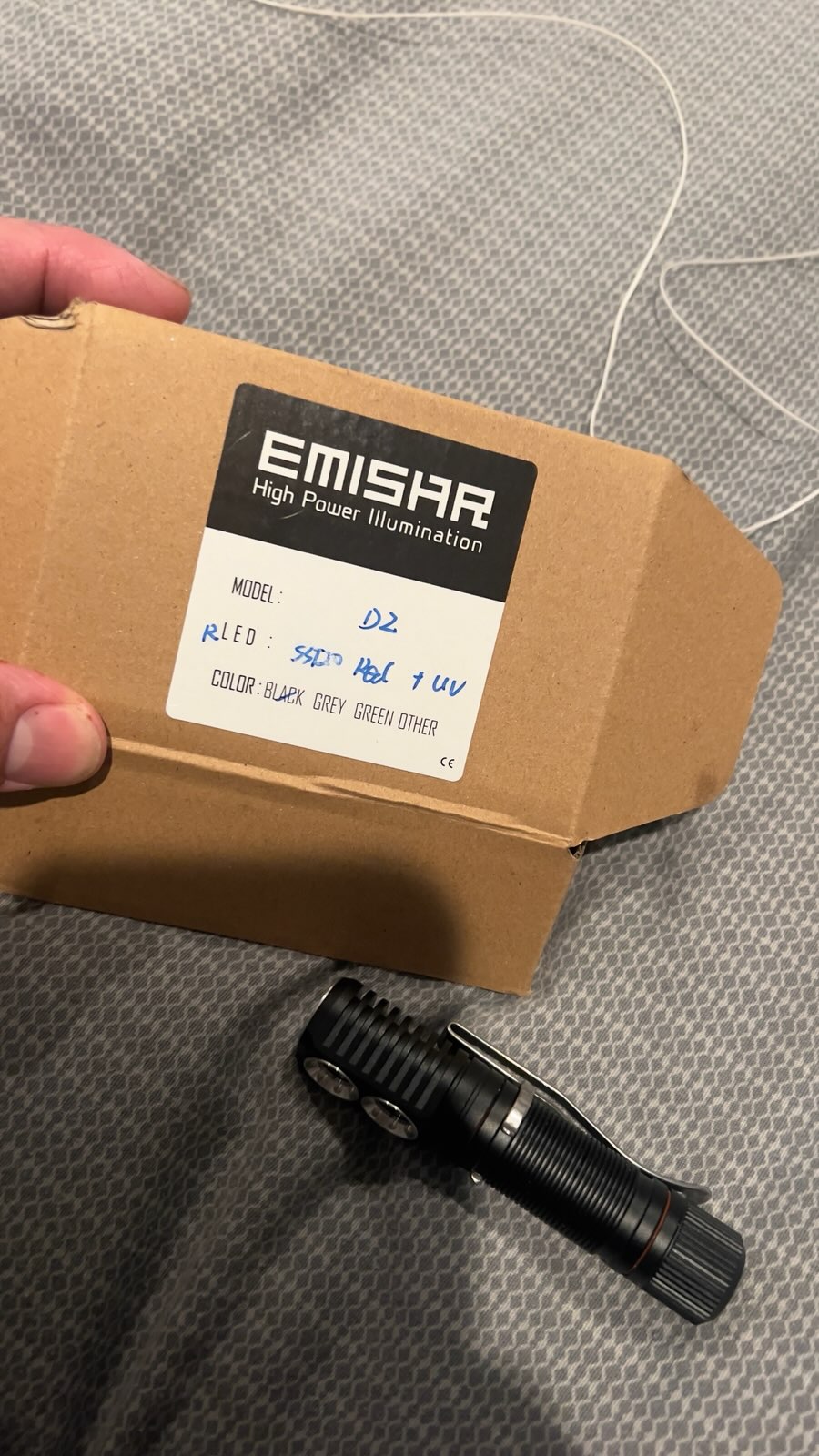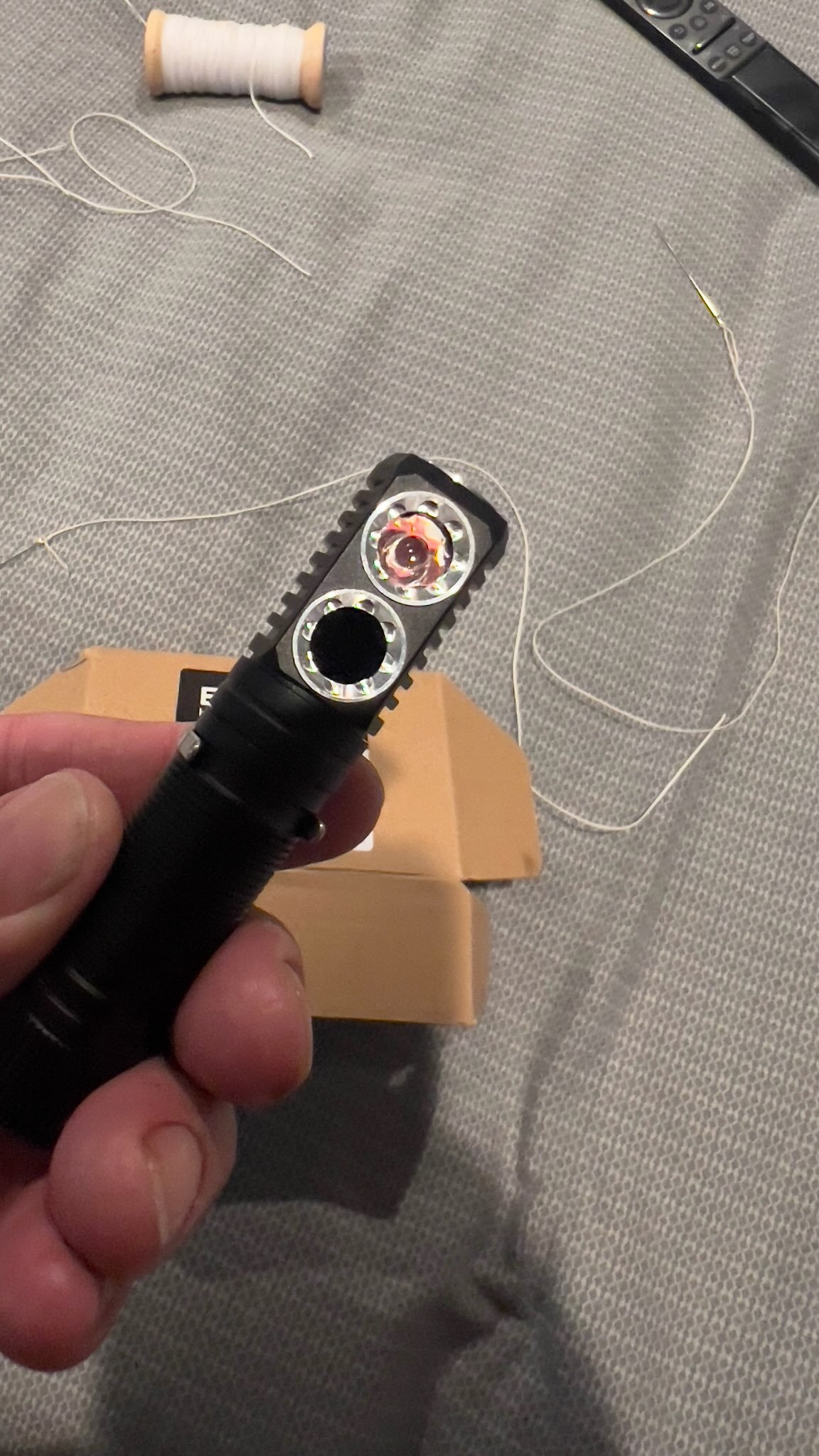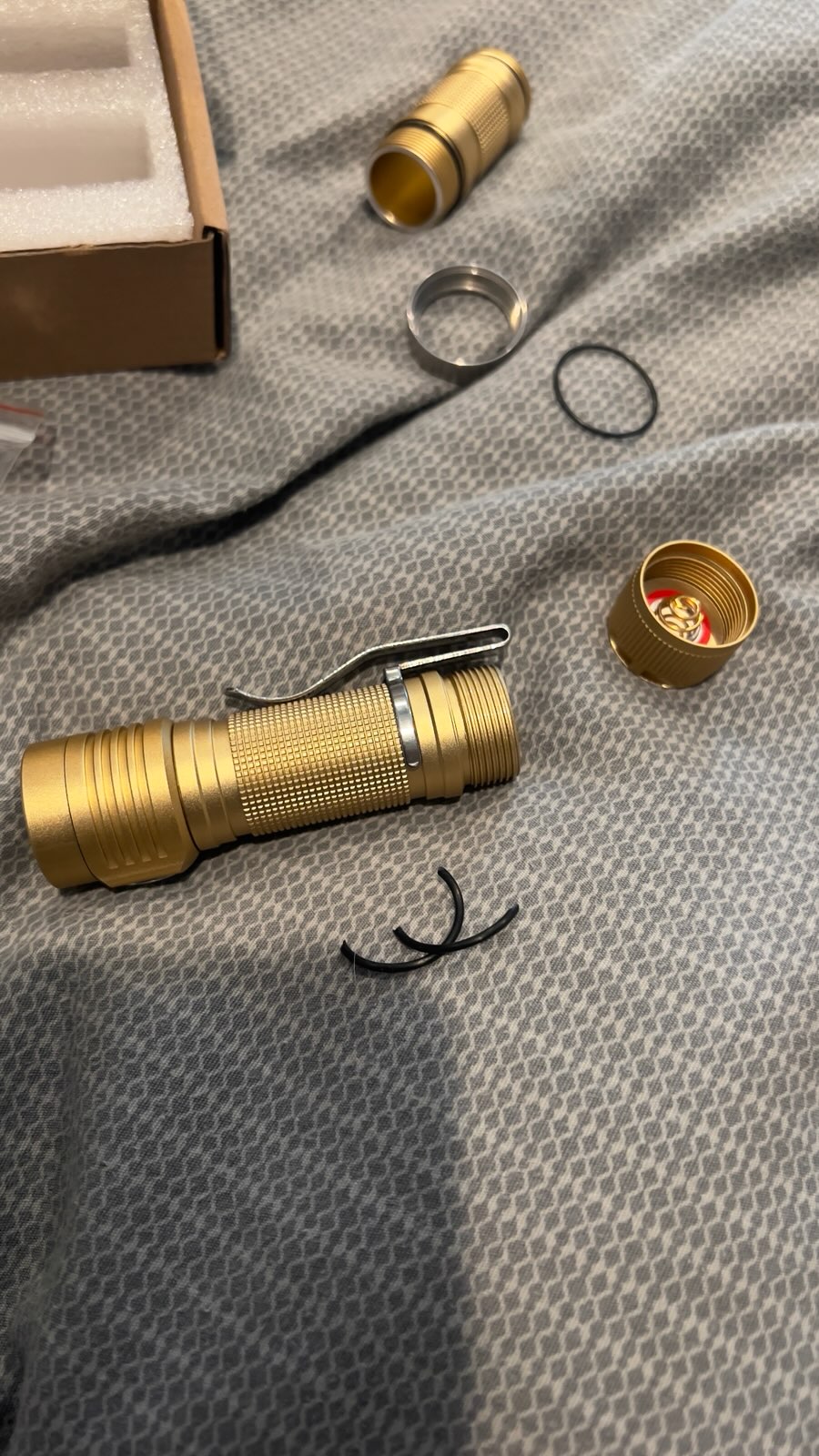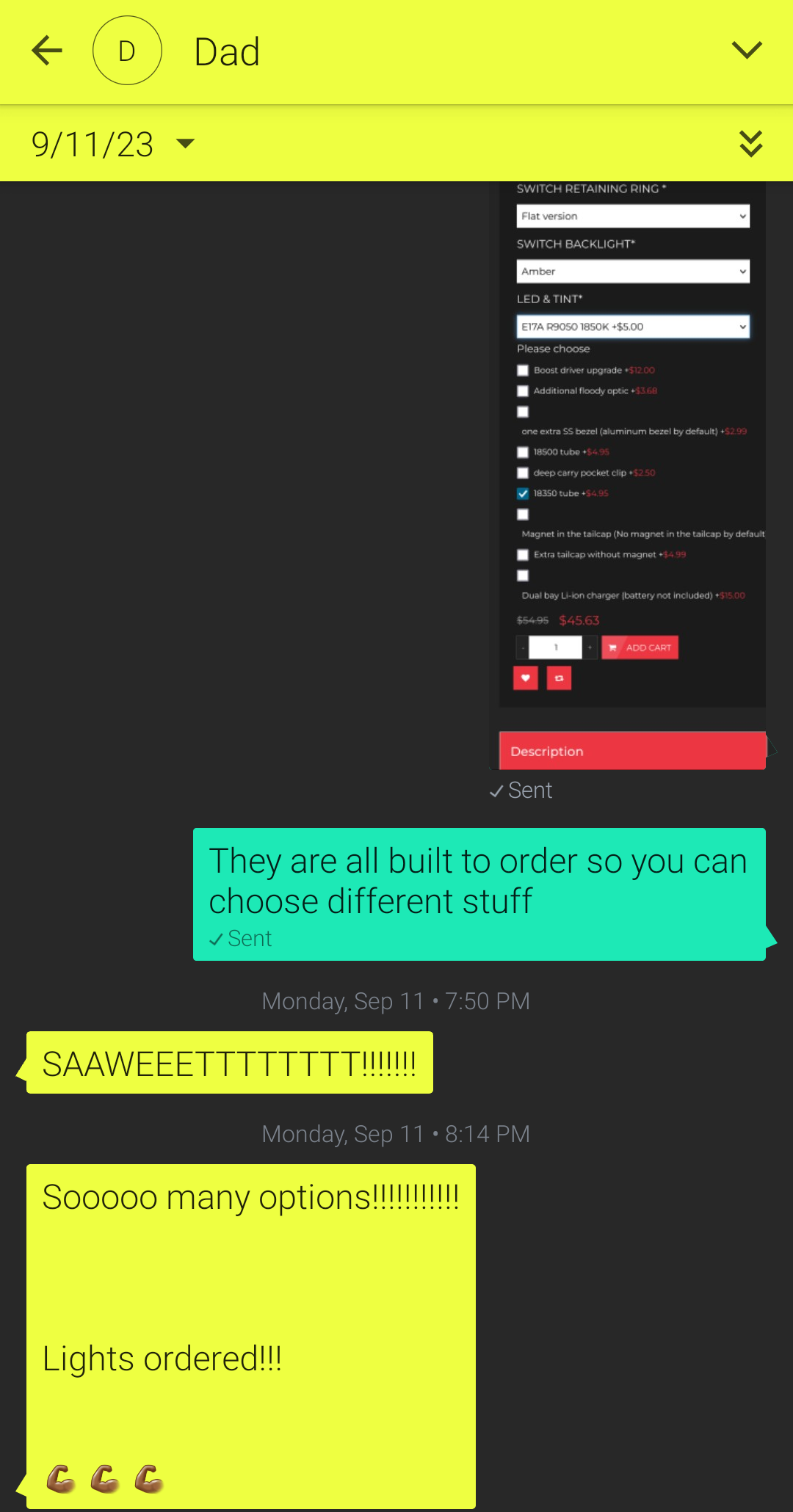ONE OF US
flashlight
Portable illumination
Rules:
- Be excellent to each other
- Don't be the reason we need to make more rules
Related:
Saw this post on "All". I'm not part of the community, but I'm curious on what's the deal here? I looked into this "hanklight" for FOMO. I don't get it. I've bought similar flashlights with similar brightness, metal construction, colored leds, etc. for under $10. None of the materials or tech is expensive to produce. Why pay >= $50 for these hanklights?
I think the community here would be interested to know what flashlights you have that seem comparable for $10.
They probably aren't comparable. They're likely not as well built; they almost certainly don't have LED options with good color quality; they probably use PWM (rapid flickering) for their low modes; most other lights don't have firmware as sophisticated as these (and they're open source!). There's a very good chance sub-$10 lights making claims of high output are lying about it as well.
Emisar/Noctigon/Hank lights are usually seen as good value for money within the flashlight community. One thing that's unmatched is the ability to have exactly the flashlight you want built to order.
Also coming here from all. I had no idea any of the things you said were features of flashlights. Maybe a useful question for me to ask could be: what got you into flashlights as a 'thing'? Also, do you feel you have a sense of what trades and hobbies mostly comprise this flashlight community?
Lastly, in your estimation is there a reason for an average flashlight user to make the jump from $10 flashlights that are bright enough for them to find their dog's poo in the dark, to a $50 flashlight like those in this post?
This is coming from a slightly incredulous place, but I'm also trying to mentally pivot from incredulity to curiosity. I hope my tone hasn't been abrasive.
I started from a need for a flashlight I could carry in my pocket that was more capable than the LED on a smartphone and did some research because I wanted a good one. I ended up wanting several good ones, and then contributing to discussions, and then writing reviews, and then writing the Android app a bunch of other reviewers use to make runtime graphs.
There's certainly overlap with people who use flashlights and headlamps for work and in their other hobbies, but there's also a community of people who make a hobby out of everyday carry gear itself. Flashlights, pocket knives, and pens are among the most popular items, and some are as decorative as they are functional.
in your estimation is there a reason for an average flashlight user to make the jump from $10 flashlights that are bright enough for them to find their dog’s poo in the dark, to a $50 flashlight like those in this post?
For most people who aren't (yet) interested in flashlights as a hobby, what I'd actually suggest is a $30 flashlight: the Wurkkos FC11 (Nichia 519A version). This has:
- An 18650 Li-ion rechargeable battery (included). At higher output, an 18650 has as much capacity as 6-10 alkaline AAs. That shrinks to 3-4 at lower output, but it's much smaller than 3-4 AAs.
- USB-C charging, so a separate battery charger isn't required (you can get one, and spare batteries if you want).
- Tint and color rendering that closely match sunlight, compared to blue-white that's missing a bunch of spectrum and washes out colors for the average LED flashlight.
- Magnetic tailcap.
- It's probably also quite a bit brighter than your $10 flashlight.
Is that worth spending 3x as much? If you were using disposable batteries, almost certainly; it'll be cheaper in the long run. Beyond that, it depends on how much you use portable lighting, how much you care about the features above, and how much you'll miss the money.
Of course, it's all diminishing returns once you've gone from it's too dark to see to I have enough light to see.
This could be a slippery slope for me ... I don't even use a torch
Color accuracy, standard 18650 batteries (rechargeable,replaceable,and better than disposable batteries), LED brightness (incredibly bright), and a firmware that allows you to change settings on the flashlight are all big reasons we enjoy these lights rather than big box flashlights.
For one thing, cheap lights rarely have good color rendering. They make people look like zombies, wash out detail, and just don't do color very well. If you cannot tell brown from green, you will step in that dog mess in the lawn. While some enthusiast-grade lights also do that, most enthusiast lights that lack color rendering make up for it with sheer throw. Often in the 400-800m range, and sometimes up to 2,900m (yes, ~1.8 miles).
As for "similar brightness", a lot of cheap lights do not meet their claims while enthusiast lights do. For instance, the light you see sold a lot under hundreds of different names (including Gearlight S1000) and many of us get a cheap knockoff free with our battery orders claims 1,000-2,000 lumens depending who slaps their name on it, but it actually doesn't even make 300. The D2 gets about double that at startup. On one channel. Oh, and if you zoom that Gearlight to max throw, it's only 86 lumens; about half of what a D2 can sustain for the entire charge of it's battery. Here is what a 1,400-lumen light that *actually *makes 1,400 lumens looks like. And both the D2 and TS10 are tiny lights that run on an AA-sized battery. Larger lights are more powerful.
Hanklights (Emisar/Noctigon) also have the option to be configured many different ways. Hank is famous for shipping accordingly. Your choice of color temperature, some emitters available in actual (often monochromatic) colors like Deep Red, or maybe you want a UV light that has a filter that cuts the non-UV part of the beam out. Some lights, like the D2, offer multiple choices as they have two or three channels.
Metal construction doesn't mean much if you use cheap metal and/or bad machining. The build quality is notably better for enthusiast-grade lights.
In short, it's the difference between a decent restaurant and McDonalds.
Just to add to the other great response, the “D2” pictured above is configured with one ultraviolet emitter and one “deep” red emitter which is not an easy combination to find. And there is a wide range of emitters to choose from based on preference.
This is one of the most wholesome hobbies ever, love it
Dude that is so wholesome. Love your dad! Lol.
This just sent me down a rabbit hole for the last hour, I may have to buy one or two now... there are so many options and I love it
Woa, Hank's website is hella-confusing. For example, I managed to Google what 18350 and 18500 tubes are (if Hank offers an explanation, I couldn't find it), but what happens if you pick neither tube? Every flashlight has to have some sort of handle, surely.
Most of them are sized for 18650s by default, the shorter tubes are options for those that want a stubbier torch
Aah! Thank you.
He's definitely marketing to flashlight enthusiasts who want a semi-custom light built to their specs. If you have a use case in mind, people here can suggest specific builds for you.
I do, yes. I want to be able to see while in the woods at night, with high potential for rain and reasonable potential for mist/fog, and surrounded by other people.
So e.g. I need the light to be red, to mitigate ruining the night vision of those around me. And ideally I need a rougher grip, lest I drop it when wet.
Flashlight community standard advice is to use ultra-low white rather than red to preserve dark adaptation. If you do use red, it needs to be far red (over 650nm or so) to achieve the results you're hoping for. We also tend to suggest headlamps if you're in the woods and might drop things, or right-angle lights that can be use either handheld or as headlamps.
Some of the favorite right-angle lights are the Skilhunt H04 RC (Nichia 519A), Armytek Wizard Pro (Nichia 144A), Zebralight H600Fc, Skilhunt H150 (Nichia 519A), and Skilhunt H300 (Nichia 144A). The Zebralight and Armytek have the lowest low modes of these.
But if you do want something from Hank, first pick a host:
- D4v2 - sideswitch flashlight with an 18650 battery
- KR4 - a D4v2 with a tailswitch
- D4K - bigger (21700) battery
- DW4 - right-angle design
And a number of channels - you can choose to have just one type of main LEDs in the light, or two, or three.
- One - running four of the same kind of LED has advantages for output and efficiency. It's also the only option that offers the boost driver, which trades some maximum output for much better efficiency, and much higher *sustained *output than the default linear driver.
- Two - you could switch between red and white, warm and cool, flood and throw, etc...
- Three - D4K only - flood/throw/red, etc...
As for LED selection, I'll narrow it down to three and a half options for you:
- For general use, get the Nichia 519A. It has decent output and efficiency with excellent color rendering. You'll need to pick a color temperature. 4500K is like afternoon sunlight. 5700K is like midday sunlight on summer solstice at the equator. 2700K is like an incandescent bulb.
- With the 519A, you can choose to have the LEDs dedomed. This makes the beam a little more focused and gives it a more rosy looking tint as well as reducing the color temperature. 5700K becomes more like 4300K.
- SST-20 deep red - if you want red.
- W2 - poor color quality, but maximizes throw distance
The other options you can pick are cosmetic or ergonomic.
Off to a nice start :)




